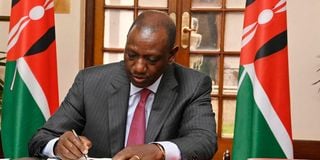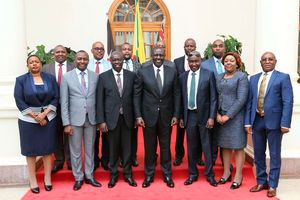
President William Ruto assents to the Supplementary Appropriation (No.3) at State House, Nairobi in November 2023.
Uncontrolled government spending is a problem. It forces higher taxes, and budget deficits. High and continuous budget deficits are a problem because they push the private sector out of the credit markets, undermining incomes and job creation.
Too much debt chokes public investments as more tax revenues go to service the debt. And election campaigns based on negative populism are a problem. These government-created problems are not unique to Kenya. They are truisms of public sector management world over. But to tell that tale, I need to start with another.
When I heard the word frenemy earlier in the week, I protested. Surely, no such word exists in the English language. It would be an oxymoron, I said. Look it up, my wife chided me. I was mistaken.
It is indeed a word. A blend of the words friend and enemy, it apparently emerged in the 1950s, to describe “a person with whom one is friendly despite a fundamental dislike or rivalry”. According to online sources, the use of the word has dramatically increased in the 2000s.
The Cambridge Dictionary defines it as “a person who pretends to be your friend but is in fact an enemy”. And now that I know the word, I prefer the Merriam-Webster definition. “A person who is or pretends to be a friend but who is also in some ways an enemy or rival”.
And it fits perfectly the context that my wife was describing. Your frenemy said hello, she said, relaying greetings from a friendly politician with whom I fundamentally disagree.
The subtext of the greeting was that I should not be so critical of the current administration. My frenemy was particularly stung by a recent column, the illusion of performance. In it I detailed the insatiable and ridiculous practice of “launching” projects, both real and imaginary, pointing out that some projects were being launched several times.
But no sooner had the greetings reached, and as if to prove my point, the president and his deputy went to “launch” the refurnished and expanded New KCC factory in my home town of Nyahururu this week. And wait for it, two and half years after the same had been done by then CS agriculture and Yours Truly.
Frankly, it is quite hard to find something positive to say about this regime. But more fundamentally, it is not my role to sing accolades for them. I am in the opposition. They are in office. Controversially, I might add. I was campaign chair of Raila Odinga, who many of us believe won.
Now water under the bridge, we contested the announced results at the Supreme Court. No joy there either. We accepted and have sadly lived with the verdict, but respectively disagreed.
The language of the decision, however, I resent to this day. It should have been enough for the Supreme Court to simply say they were not persuaded by our evidence and argument. There was never, and will never be, a need to insult, deride, put down, nor chastise Kenyans who are seeking justice.
My frenemy and I fundamentally disagree on the role, and conduct of government, and the proper management of our small, open economy. And if my criticism stings, then I am playing my rightful role.
I find that governments can very often be the problem, or in the very least part of the problem, as opposed to the solution. Now, before you ask if I have joined Ronald Reagan’s Republican Party, let me explain.
My frenemy and many politicians seem to think that governments can increase budgets willy-nilly, without limits nor consequences. And when they do that, they became a problem, for to finance the budget you have to tax and borrow. And too much of both or either inflicts serious pain on the citizens.
What then is the proper role of governments? In the end, the purpose of government must be to improve the quality of life of the citizens. Quality of life is about real incomes – what can your money buy? But it is also about services such as education, health, water and transport that are available, and the environment you live in. The purpose of government cannot be to impoverish her citizenry.
Income comes from productivity. It is about putting innovation to work. That requires capital. In any economy, there is only so much of it available. If a government soaks up most of the credit in a nation, it starves the private sector. Further, to attract the credit, government offers very high interest rates. So even the little credit available to private sector is expensive. All this compromises jobs and incomes, and means that there is less for the government to tax!
The ever-growing budget deficits in our nation mean that government has to offer really high interest rates to attract money to itself. The recent tax-free infrastructure bond offers have been at 22 per cent. For the few who invest in them it is a good return. But for millions of micro and small businesses, it could mean sudden death. As businesses struggle, KRA misses the revenue targets. And the government ends up borrowing even more.
The 2023 finance act was punitive enough. But some of the 2024 proposals will shock you. Taxing education services as has been proposed is certainly a step too far. Forcing our cooperatives to take withholding tax on farm produce we deliver to them will accelerate the cost of living. Re-introducing minimum tax smacks of the antics of colonial Kenya.
My frenemy insists that a political realist knows that the end justifies the means. I disagree. If you lie to win, not only will it come back to haunt you, it undermines the republic and our democracy. Kenya Kwanza leaders promised Kenyans lower taxes, cheaper cooking gas and electricity, and lower cost of living. The regime cannot now complain, when the citizens demand that the promises be kept. And for mismanaging the economy, government is the problem!
@NdirituMuriithi is an economist







